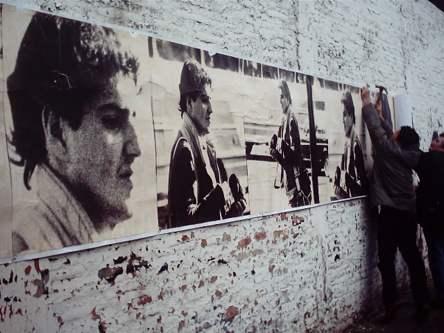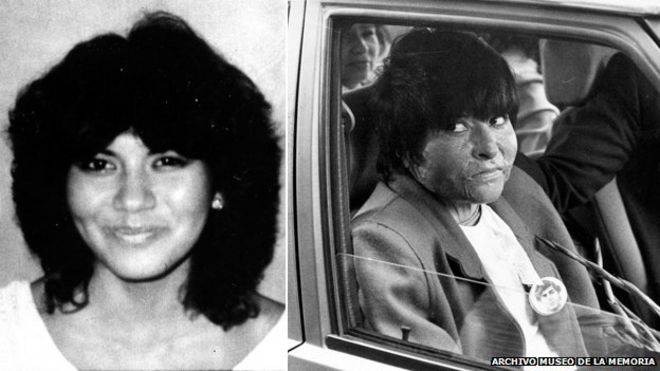Latin America
Related: About this forumChile doubles down on prosecutions for Pinochet-era crimes
Chile doubles down on prosecutions for Pinochet-era crimes
Source: Reuters - Sun, 1 Nov 2015 19:25 GMT
By Gram Slattery
SANTIAGO, Nov 1 (Reuters) - For nearly three decades after Veronica de Negri's 19-year-old son Rodrigo Rojas was burned to death by Chilean soldiers during the dictatorship of Augusto Pinochet, her hunt for justice had been fruitless.
Two legal battles failed, as unsympathetic judges and amnesty laws foiled all attempts to bring charges.
But then in July 2015, she finally had a breakthrough. Cajoled by the Supreme Court president, prosecutors charged seven former military officers for burning de Negri's son alive while he was photographing a political protest in 1986.
"I wanted to scream to the world what was happening," said de Negri, who was told of the arrest warrants before they were served.
Read more: http://www.trust.org/item/20151101192658-gkjxo/
Wikipedia:
Background[edit]
Rodrigo Rojas was born in the port of Valparaíso, the son of Verónica DeNegri, a communist party activist. In 1976 at the age of 10, and after the Chilean coup of 1973, he was sent to live with relatives in Canada. Soon thereafter, his mother was arrested for political activities against the government of General Augusto Pinochet and later exiled. They were reunited and settled in the Washington D.C. area of the United States. There he attended Woodrow Wilson High School, and later studied photography. In 1986, Rojas-DeNegri, by then a young American photographer, decided to visit Chile for the first time since he had left for the exile.[citation needed]
Events of the case[edit]
During this time Chile was experiencing widespread political instability and human rights abuses. A national protest was organized for 2-3 July 1986. Rodrigo Rojas, who had been in the country for only six weeks, decided to try to participate and document the barricades that were going up in different areas of Santiago.[1]
At 8:00 am on 2 July 1986, he was among a small group of people that were setting up a barricade in the Los Nogales neighborhood, in the municipality of Estacion Central. According to the official report, endorsed and quoted at a speech by General Pinochet himself, the group was carrying five old tires, a molotov cocktail and a gallon of gasoline. They were intercepted by an army patrol that was clearing barricades in the area of General Velázquez Avenue. All escaped except for Rojas and Carmen Quintana, an engineering student at the University of Santiago. The patrol, under the command of Lieutenant Pedro Fernández Dittus, was composed of three officers, five noncommissioned officers, and 17 soldiers.[1]
There are two versions of the succeeding events: the first, which was officially endorsed and quoted by General Pinochet at a speech, states that as Quintana and Rojas were arrested by a military patrol, some of the molotov cocktails they were carrying broke, setting them on fire accidentally. The opposing version (of Quintana, the only survivor) alleges that both were severely beaten by military personnel, and later soaked with gasoline and set on fire.[citation needed]
After both were aflame and unconscious, patrol members wrapped them in blankets, loaded them into a military vehicle and drove them to an isolated road in the outskirts of Santiago, over 20 kilometers away. There, in an irrigation ditch, they were dumped and left to die. Some agricultural workers found them and notified the police, who then took them to a public hospital. Rodrigo Rojas' burns were fatal. He had second- and third-degree burns that covered 90% of his body, a broken mandible and broken ribs, and a collapsed lung. He lingered for four days after the incident, and died on 6 July 1986.[2]
https://en.wikipedia.org/wiki/Rodrigo_Rojas_DeNegri
[center]
Rodrigo, with his mother, Veronica de Negri



Carmen Quintana before (left) and after the attack (right) [/center]
Carmen Quintana: Set on fire by Pinochet's soldiers
By Mike Lanchin
BBC World Service
10 September 2013
Forty years ago, Gen Augusto Pinochet seized power in Chile - 17 years of military rule followed, during which thousands of people were tortured or killed. One woman who was doused with kerosene and set on fire, survived to tell the tale.
Carmen Quintana has one lasting image from the day, 27 years ago, when she and another young Chilean student were attacked, and set alight by soldiers during an anti-government protest.
"I just looked down at my blackened hands and at my burning clothes, and I suddenly saw myself in flames," she says. It was 2 July 1986, the first of two days of nationwide strikes in Chile against Augusto Pinochet's rule.
Eighteen-year-old Carmen was a serious young woman with thick bushy hair, from a left-wing family fiercely opposed to the Pinochet regime. From an early age she had gone with her parents on anti-government demonstrations - and had witnessed first-hand the repression meted out by the feared Carabineros, Pinochet's jackbooted police.
More:
http://www.bbc.com/news/magazine-24014543
EdwardBernays
(3,343 posts)[slow clap]
Judi Lynn
(160,555 posts)I know the history of the US in Chile...
forest444
(5,902 posts)It's hard to overstate the violent resentment most right-wing white Latin Americans (not all of them are) feel for the social demands of the mostly colored working class/poor majorities they share their respective countries with.
What later became the nations of Latin America, let's remember, were mostly established as slave colonies. And after 600 years, many white Latin Americans don't want those who traditionally belonged to the slave/servant classes doing anything else.
Now, the era of violent left-wing resistance to this iniquity - and the wave of atrocities unleashed to counter it - was not only a tragedy in itself, it played right into the hands of the most reactionary Latin Americans. Vote for our puppets, the reasoning goes, or El Che will get you (and if he doesn't, we will).
It may sound like a relic from the Cold War; but to Latin America's mostly right-wing media barons, this line of attack is as fresh as ever.
This is why Latin American progressives must continue to build on their successes at the ballot box over the last 10 to 15 years as much as possible, and on the goodwill the success of moderate policies (not Venezuela's, tragically) have created among the dispossessed - and, I might add, among much of the working and middle classes. That's the key.
Fred Sanders
(23,946 posts)Judi Lynn
(160,555 posts)Fred Sanders
(23,946 posts)Truth and Reconciliation is the only way out now for the mass crimes of dead madmen.
The alternative to that , I think , is trials before they are dead, or risk repeating history.